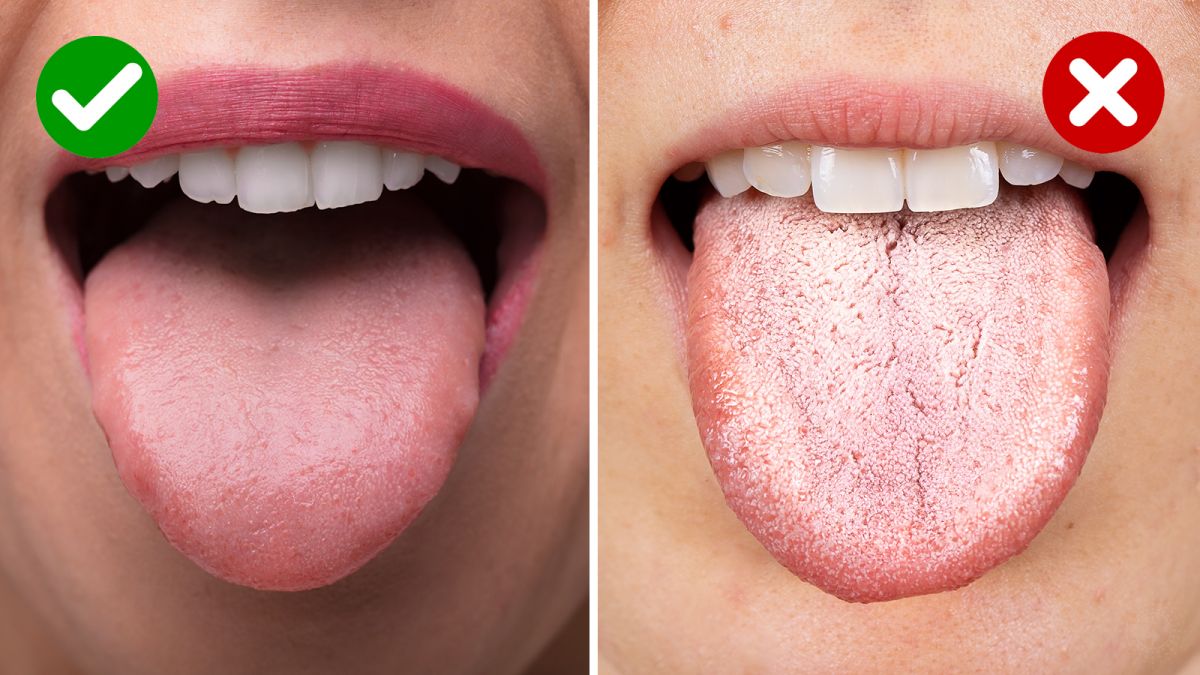5 Things Your Tongue is Trying to Reveal About Your Health
When you stop and examine your tongue in the mirror, you might spot indications that several health problems you suffer are present:
5 Things Your Tongue is Trying to Reveal About Your Health
1. Cracks
Cracks on the tongue typically appear in the middle or back and are a sign of a leaky gut, intestinal malabsorption, allergies, or food sensitivities.
2. Mucous
The tongue has its typical film, but if the mucus is greasy, thick, yellow, or white, it may indicate a mucus buildup and toxins in the bowels. If it builds up in the back of the tongue, you have a colon problem. If it builds up in the middle of the tongue, it is a sign of a small intestine problem.
3. Brown or Black Fuzz
Even though dark tongue hairs can be very unpleasant, they do not necessarily indicate a serious problem. Family doctor Jack Der-Sarkissian of Kaiser Permanente in Southern California says:
“Typically, smoking, drinking coffee and dark teas, or having poor oral care, cause [black and hairy tongue]. It could only be necessary to stop problematic behavior, such as smoking, and brushing or scraping the tongue.
4. Teeth Impressions on the Sides of the Tongue
This is a symptom of poor digestion or absorption of minerals. The cracks and teeth imprints are a symptom of an issue in the intestines, and teeth imprints can also indicate low stomach acid.
5. Persistent red lesions
This could be an early indicator of tongue cancer, but you shouldn’t be alarmed right away. Also, be careful not to mistake them for canker sores, patches, or red lesions that go away on their own after a few weeks. What you need to do is check it out right away and figure out what’s wrong.
The health of the internal organs will be supported by maintaining a clean tongue. Therefore, be sure to scrape it with a tongue scraper once or twice each day to purify it, promote digestion, and improve the performance of all body organs. Additionally, its regular monitoring is an effective preventative measure that will aid in preventing significant health problems, and any positive changes will track your progress in terms of health.
How to Keep the Tongue Healthy
To keep your tongue healthy, you can follow these simple tips:
Maintain good oral hygiene: Regularly brush your teeth and tongue at least twice a day and floss once a day. This helps remove bacteria, plaque, and food particles that can lead to tongue issues and bad breath.
Scrape your tongue: Use a tongue scraper or the back of your toothbrush to gently scrape your tongue's surface. This helps remove any residual bacteria or debris that brushing alone may not eliminate.
Stay hydrated: Drink plenty of water throughout the day to keep your mouth and tongue moist. A well-hydrated mouth is less likely to develop dryness or bad breath.
Avoid tobacco and alcohol consumption: Smoking and alcohol intake can irritate the tongue and contribute to oral health problems.
Eat a balanced diet: Consume a variety of nutrient-rich foods, including fruits, vegetables, whole grains, and lean proteins. This ensures that you get essential vitamins and minerals for overall oral and general health.
Limit sugary and acidic foods: Sugary and acidic foods can contribute to dental decay and tongue issues. Minimize their consumption and practice good oral hygiene after consuming them.
Visit your dentist regularly: Schedule regular dental check-ups and cleanings. Your dentist can identify any oral health issues, including tongue problems, in their early stages.
Manage stress: High levels of stress can lead to mouth-related issues like teeth grinding and canker sores. Practice stress-reduction techniques like meditation, yoga, or hobbies you enjoy.
Don't ignore tongue problems: If you notice any persistent changes in the appearance or feel of your tongue or experience discomfort or pain, seek advice from a healthcare professional or dentist.
Avoid tongue piercings: Tongue piercings can lead to complications, such as infections or damage to teeth and gums. It's best to avoid them for better oral health.
Remember that maintaining good oral hygiene and overall health is essential for a healthy tongue. By following these practices and being mindful of any changes in your oral health, you can help keep your tongue and mouth in excellent condition. If you have specific concerns or problems, don't hesitate to consult a healthcare professional for personalized advice.











